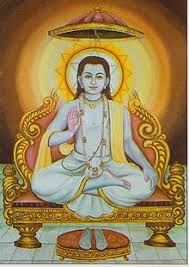|
Sri Nimbarakacharya – Dvaitadvaita Philosophy
Sri Nimbarkacharya was born in Pandarpur in Andhra Pradesh in 12-13th century. Sri Nimbarka was devotee of Krishna and spent his time mostly in Mathura, the birth place of Krishna. He wrote small work of ten verses known as Dasa-Sloka, giving a short exposition of his doctrine for beginners. Nimbaraka expounded the philosophy of Dvaitadvaita – duality in unity. He basically adapted the doctrine of Bhedabheda of Bhaskara. According to him, Brahman has innumerable auspicious attributes but without any particular form. He transforms Himself into the world of duality and change, without losing His entity as the Absolute and unitary Being. The Jiva in his real nature is one with Brahman, but gets differentiated from Him in the state of bondage by what is called the Upadhis or adjuncts of body-mind. But in liberation, Jiva is becomes with Brahman, as a river becomes one with ocean when it enters it. According to Bhaskara, by performance of the duties imposed on one by the Vedas without any desire for their duties imposed on the practice of meditation on Brahman and the Jiva’s oneness with Him, the Jiva will be able, by the strength of his aspiration for freedom, to release him from the bondage imposed by Upadhis. Bhaskara’s system does not preach devotion to any form of the Deity, nor does it affiliate itself with any personalistic cult. Nimbarka’s Dvaitadvaita philosophy is as under: Brahman is only independent entity. He is known by several names as Parmatman, Bhagavan, Isvara, Rama, Krishna and Purushottama. He is free from the five kinds of imperfections (Klesas) viz. ignorance, egoism, attachment, hatred and fear of death. He is omniscient, omnipotent and His will is always accomplished (Satya-sankalpa). He is free from law of karma. He is Nirguna (without three gunas of Prakriti – Sattva, Rajas & Tamas). He possesses the six unique qualities – Jnana (knowledge to perceive everything), Shakti (Power to make everything), Bala (Strength to support world), Aishvarya (Sovereignty), Virya (tireless energy) and Tejas (Prowess to suppress opposing forces).
Reference: Bhakti Schools of Vedanta – by Swami Tapasyananda, Sri Ramakrishna Math, Chennai.
0 Comments
Leave a Reply. |
Archives
July 2024
Categories |

 RSS Feed
RSS Feed